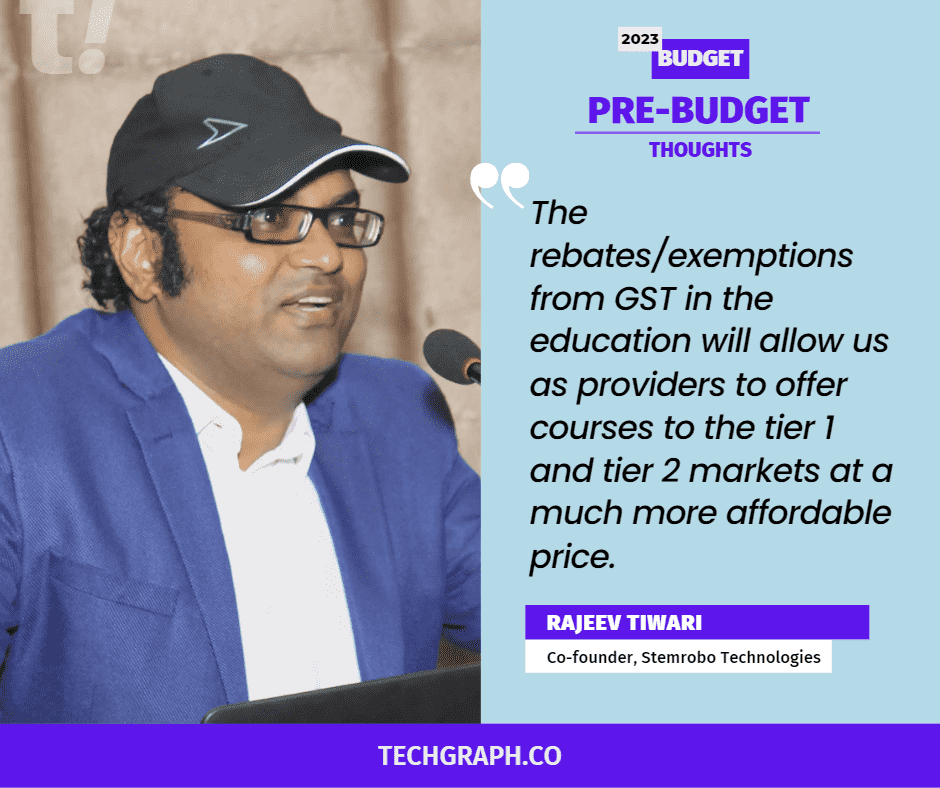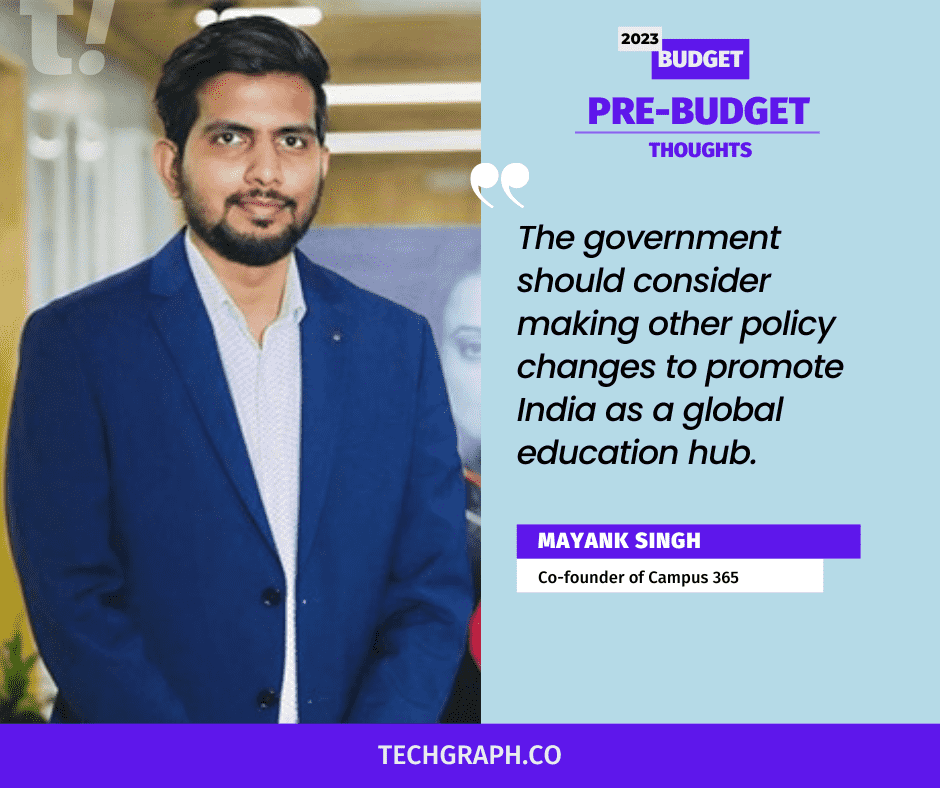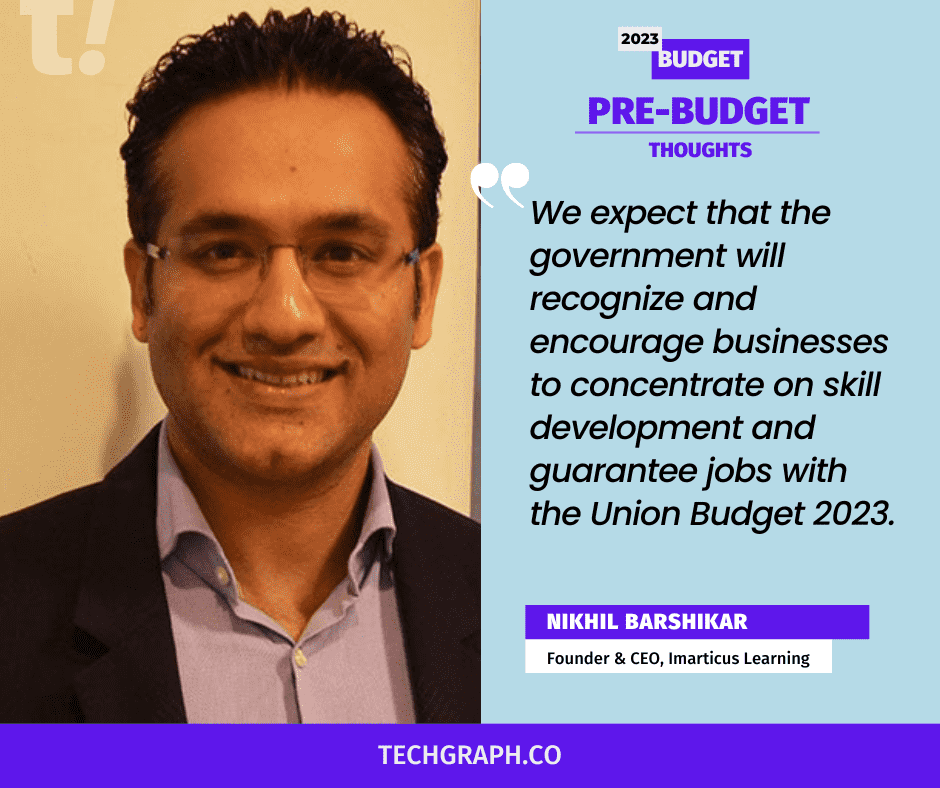Over the past few years, there has been an upward trend in the Indian Edtech market. The need for enhanced abilities in a competitive marketplace and the ease of learning from anywhere at any time are some of the main drivers of growth in this industry.
The education sector, which is among the top contributors to the economy and so remains a significant part of every year, has big ambitions to maintain the Union Budget for the year 2023-2024, which is just around the corner. To put things in perspective, the government provided a sum of Rs 63,449.37 for school education and literacy and Rs 40,828.35 crore for higher education. This was in last year’s Union Budget for 2022–23. The Union Budget 2023 will be presented by Finance Minister Nirmala Sitharaman on February 1, 2023.
Tax exemption on the supply of goods and services to academic institutions and intermediaries can reduce the overall cost that is currently passed on to schools and parents.
Industry players are anticipating the government’s effort to create a more robust ecosystem for digital education that supports learning and a solid strategy to hasten the implementation of the New Education Policy (NEP) 2020 in the 2019 budget.
Taxation techniques
Though understanding the sensitivity and importance of the education sector, the GST Act has tried to maintain a fine balance whereby core educational services like books are exempt from GST, and other commercial education services like online courses, and skill-based offline solutions are taxed at a standard rate.

“The education sector plays an imperative role in shaping the future of India. As we all know, a majority of products and services are under the purview of GST in India. The rebates/exemptions in GST will help to lower the prices of the courses/solutions offered and thus help the Education solution providers be able to penetrate tier 1 and tier 2 markets at a much more affordable price thus benefiting a large segment of the market” said Rajeev Tiwari, Co-founder of Stemrobo Technologies.
As the importance of skill development courses rises day by day, it is much needed to ensure rebates are given to the companies working around to develop curriculum and educational solutions and ensuring the benefit of those rebates is passed on to the consumer I.e. the parents and students in this case.
Education Hubs
The government may also consider making other policy changes to promote India as a global education hub. This could include simplifying the visa process for international students, providing tax incentives for foreign universities that set up campuses in India, and promoting India as a destination for education tourism

“The National Education Policy from 2020 is expected to be implemented soon, and it aims to bring about comprehensive and inclusive reforms across the entire education spectrum. These reforms include initiatives such as increasing access to education and technology, promoting research and experimentation, and encouraging lifelong learning. Additionally, the government may also focus on vocational training, and provide more opportunities for international students,” said Mayank Singh, Co-founder of Campus 365.
India has a large population and a rapidly growing economy, making it an attractive destination for education. However, there are several areas in which the Indian education system needs to improve to become a global education hub.
Digital infrastructure
With the increasing focus on learning by doing and bringing technology into the classroom, the ecosystem is becoming more vibrant and interactive.

“We expect that the government will recognize and encourage businesses to concentrate on skill development and guarantee jobs with the Union Budget 2023. We also want the government to recognize “Skill-to-Job” as a distinct category and support ed-tech platforms with various programs or tax breaks. Students and professionals are choosing online courses in record numbers, particularly in tier two and three cities. Building a reliable digital infrastructure for such towns presents a problem. Upskilling is essential in light of new technology and market trends. We hope that the budget will pay particular attention to this area” said Nikhil Barshikar, Founder and CEO, of Imarticus Learning.
With eBooks, the course content can be embedded with videos, augmented reality, audio files, etc which are beautifully managed by Learning Management systems. Unlike a printed book, the new interactive ways of learning allow for more student-teacher engagement to take place in the classroom.
Budget 2023 will be essential to maintaining the rise India’s education sector has witnessed over the past three years. This is because businesses in the edtech sector are experiencing losses, making layoffs, halting expansion plans, and seeking to preserve cash amid a financing winter.




